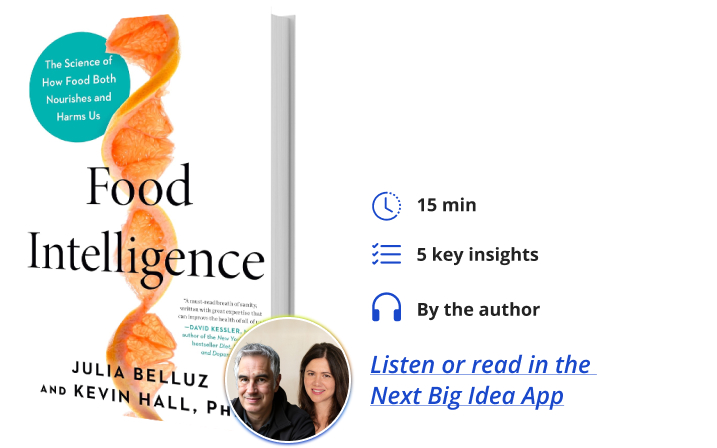Below, co-authors Julia Belluz and Kevin Hall share five key insights from their new book, Food Intelligence: The Science of How Food Both Nourishes and Harms Us.
Julia is a health journalist. She is a contributing opinion writer for the New York Times and has reported extensively on medicine, nutrition, and global public health. Previously, she was Vox’s senior health correspondent in Washington, DC.
Kevin is a nutrition scientist who was based at the National Institute of Health (NIH) for many years. He is an internationally recognized expert in human nutrition, metabolism, obesity, and neuroscience. He has received numerous awards for his groundbreaking clinical research investigating how food environments shape diet and how diet affects physiology.
What’s the big idea?
Willpower alone cannot explain our eating habits and the global rise in obesity. By exploring the science and history of why we eat what we eat, we uncover the complex biological, psychological, and cultural forces that shape our diets and debunk long-standing myths about food and self-control.
Listen to the audio version of this Book Bite—read by Julia—below, or in the Next Big Idea App.

1. A slow metabolism is not the reason for most weight struggles.
Kevin did some fascinating work on a TV show called The Biggest Loser, as part of his research for the NIH. He went to the show’s set to document what was happening inside the bodies of the reality show contestants during their season-long competition to lose the most weight.
That was the premise of the show. Whoever loses the most weight wins a quarter-of-a-million-dollar cash prize. Kevin witnessed extraordinary levels of willpower and self-control. These folks, who all have obesity, did hours of exercise every day while eating very little. He found a remarkable slowdown of metabolic rate while on the show, and the people with the greatest degree of metabolic slowing were the ones who lost the most weight during the contest—and then kept the most weight off for years to come.
Metabolism is more the cart than the horse. Rather than being determinative of who will lose the most weight or gain the most weight, it seems that metabolic rate slows down in response to provocations, like many hours of daily exercise or cutting calories. Metabolic slowing reflected participants’ hard work, not their destiny.
I had long believed that a slow metabolism was the reason I struggled with weight. It turned out I had a completely normal metabolic rate for my age, gender, and body size. In fact, that’s true for most people. Other factors better explain why so many of us have a hard time achieving our weight goals.
2. Don’t fixate on maximizing protein.
You lose the protein you don’t use. The extra calories you take in end up being stored as fat. There really isn’t any good reason for the average person to unduly focus on ramping up protein intake. There are exceptions, such as athletes, bodybuilders or older adults, but most people who eat enough calories get enough protein.
“Metabolism reflected participants’ hard work, not their destiny.”
This obsession has persisted across centuries, but the latest science is revealing a different story. One emerging question is whether eating excess protein might actually reduce lifespan, and some animal studies are pointing in that direction.
3. Carbs versus fats is the wrong debate.
Kevin and others have conducted remarkable research on cutting or adding calories in the form of different macronutrients—carbs or fat—and then tracking what happens to body composition. What they found is that people who cut down on carbs lose roughly the same amount of body fat as those who cut down on dietary fat when the calories consumed are equal. In other words, carbs aren’t uniquely fattening.
Carbs and fats in your diet actually behave like friendly coworkers in a diet, covering for each other when one takes time off. The body can essentially react like a flex-fuel vehicle and adapt to whatever we’re fueling it with. When you’re eating more calories than your body needs—whether those extra calories come from carbs or dietary fat—your body converts the surplus into stored fat at about the same rate. The old idea that “a calorie is a calorie” still holds up surprisingly well under modern scientific scrutiny. Instead of fixating on body fat, we should focus on how different diets alter other aspects of our health— leading to different hormone and immune responses, for example.
4. We have much less control over what we eat than we think.
We’ve been sold this idea that if only you had more willpower to eat less or change your diet or exercise more, then you could change your body to whatever degree you want. But we have much less control than we think.
“Over time, our physiology pushes back against conscious effort.”
The brain acts like the conductor of an incredible orchestra, integrating internal and external signals to guide our choices. These signals interact to make us reach for the donut or avocado on any given day. And while we have this illusion of control over our meals and snacks, there’s a lot more going on. Over time, our physiology pushes back against conscious effort.
Kevin ran a study in which he gave participants a diabetes drug that causes them to excrete extra glucose. They began to lose weight, but over time, their calorie intake crept back up to make up for that loss. It’s an incredible demonstration of how our biology regulates weight, often beyond our awareness.
5. Willpower is not enough.
When you talk about something like population-level obesity, often the conversation turns to discussions of a collective collapse of willpower: People are just lazier now, they don’t want to walk anymore, and they don’t cook their own food. But that’s not what’s going on.
Over the last several decades, the food environment has changed dramatically enough to explain the surge in diet-related diseases like obesity. It’s not just the food that has changed, but also the way we live with it and experience its marketing. The economics of food are simply different now.
“The food system we’ve designed is directly responsible for rising obesity.”
Certain foods have become the cheapest, most readily available, and most heavily advertised. Unfortunately, those tend to be the worst for our health and weight—they are most linked to overconsumption of calories. Meanwhile, the opposite is true for the healthiest foods.
The food system we’ve designed is directly responsible for rising obesity. We are told to eat more fruits and vegetables, but we have never grown enough to feed the population of the U.S. or many other countries. We need to push for change in the food systems we live in so that it is easier for people to make the right choices (consciously or not) to drive down diet-related diseases.
Enjoy our full library of Book Bites—read by the authors!—in the Next Big Idea App:
































